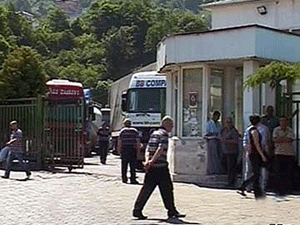Custom’s House – Space Where Orders from High Ranking Officials Are More Important than Law
Reportage from Sarpi Custom’s House
Maka Malakmadze, Batumi
 There are not many people at the Sarpi Custom’s House now. You cannot see the order of the Minister of Finances now; short time ago it was on the board though it was not put in force yet. Every citizen who crosses the border gets annoyed. They say “The law states different but here they demand excise for everything…”
There are not many people at the Sarpi Custom’s House now. You cannot see the order of the Minister of Finances now; short time ago it was on the board though it was not put in force yet. Every citizen who crosses the border gets annoyed. They say “The law states different but here they demand excise for everything…”
The Human Rights Center has already written about the problem at the Sarpi Custom’s House. According to the Tax Code of Georgia, a citizen can bring goods of less than 50 kilos for 1 000 GEL within 30 days without excise. Despite that, everybody has to pay tax at the Sarpi Custom’s House despite the weight and value of the goods.
One of the custom officers reported to the Human Rights Center under guarantee of anonymity that “we are ordered to allocate as much money in the budget as possible. So we have to demand everybody to pay excise. We received this order from the authority.”
In order to find out the situation better, the Human Rights Center decided to carry out some experiment.
I bought something at Kemal Pasha Shopping Mall (it is a cheap shopping mall in Turkey and residents of Adjara Autonomous Republic often go shopping there) and started for the Sarpi Custom’s House. I had to find out whether the complaints of the people having passed through the custom’s house were correct or not.
I had bought two skirts, two t-shirts, one blouse and one bag and came up to the custom officer. And of course, I faced the similar problem despite small amount of shopping. The officer told me I had bought too many things and had to fill in declaration.
- Show me the law based on which I have to pay excise,-I demanded the officer.
- It is demanded by the law
- I know the law and know what I cannot bring through the custom without excise.
- Please go to the office and pay the excise on your goods.
That was all. These are the only explanations of the custom officers. After I said I was representative of the non-governmental organization Human Rights Center and I had right to bring the goods through the custom, the officer allowed me to go without paying excise.
In spite of this generosity I followed the people who were supposed to pay the excise.
There were several computers in the room and officers in uniforms were working on the electronic version of the declaration. Custom officers were making notes about the goods of a passenger who was standing next to him and looked worried.
Goods of passengers were placed on a long table. There was noise and a lot of questions were asked in the room. Tired citizens were waiting for the answers in vain.
-Why should I pay excise, it is just coffee set…
-I am taking two toy cars for my nieces. I am their uncle and how should I not take anything for them…
-Please, explain to me, what I am excised for…
-Who is the head of your shift at the custom house? Let him come and explain to us everything.
-It is not written in the law. They demand excise for everything.
We could not talk with the head of the shift. Being a representative of the Human Rights Center, I went through the custom without payment but it did not work when demanding the meeting with the head of the shift.
“I was in the Kemal-Pasha market for the first time. I bought only bed-clothes and two pillows. Why should I pay tax for them?”- asked Tamuna Chinchaladze. She managed to attract the attention of custom officer Shavadze. He inquired if she had bought anything else… It took only several minutes to find out the case of Chinchaladze and after checking information she and other two citizens left the custom without paying.
The Human Rights Center tried to find out this issue with Aleko Bezhanidze, the head of the Adjara regional organization of the Georgian Ministry of Finance, but he did not answer our phone-calls (his phone number is (88832) 26 17 17).
See
Law Working at the Sarpi Custom’s House Before It Is Put In Force



